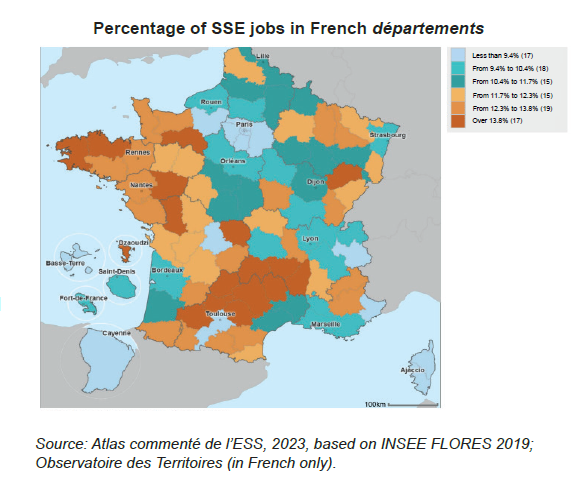The Social and Solidarity Economy: a Solution to Democratic, Social and Environmental Challenges?
This study presents the social and solidarity economy’s coverage and principles (social utility, democratic governance and low profits), measures its weighting in the French economy with regard to employment and value added, and analyses the sector’s challenges. It also explores the development of impact finance, the SSE’s local, environmental and democratic role, and the public leverage (social enterprises of social utility and solidarity savings) used to secure its development.
In 2019, the social and solidarity economy (SSE) employed almost 2.6 million wage earners (13.6% of private sector paid employment) in nearly 150,000 legal employment units and worked with 22 million volunteers. INSEE, France’s national institute of statistics and economic studies, estimates that the sector generated approximately 5% of national value added in 2012. Two-thirds of SSE staff are concentrated in three sectors (social action, education and finance-insurance).
Five categories of economic players (associations, cooperatives, mutual societies, foundations and social enterprises) share three principles: the primacy of social utility, democratic governance and a non-profit nature. Act 2014-856 of 31 July 2014 raised the sector’s profile, facilitated statistical monitoring and consolidated the sector’s representative structures.
SSE entities suffer from financial vulnerabilities. They have a good risk profile and a low three-year default rate. Nevertheless, their median margins are no more than 14.6% (compared with 24.6% in the ‘conventional’ sector) and their equity remains low, which increases their structural exposure to public budget constraints.
SSE funding obstacles are caused by a lack of understanding of its models, significant information asymmetries and the fragmentation of fledgling impact finance. Solutions are emerging: €18 billion in solidarity savings fund deposits (+27% per year), €9-billion channelled into the SSE from regulated tax-free savings accounts (Livret A and LDDS), government-backed guarantees and impact contracts.
The SSE represents as much as 25% of employment in certain rural départements (Lozère and Deux-Sèvres) and provides key services such as home care, integration and culture.
The SSE plays a key role in environmental and democratic challenges. It is a circular economy pioneer, with two-thirds of reuse sector jobs, and helps spread new governance practices.
